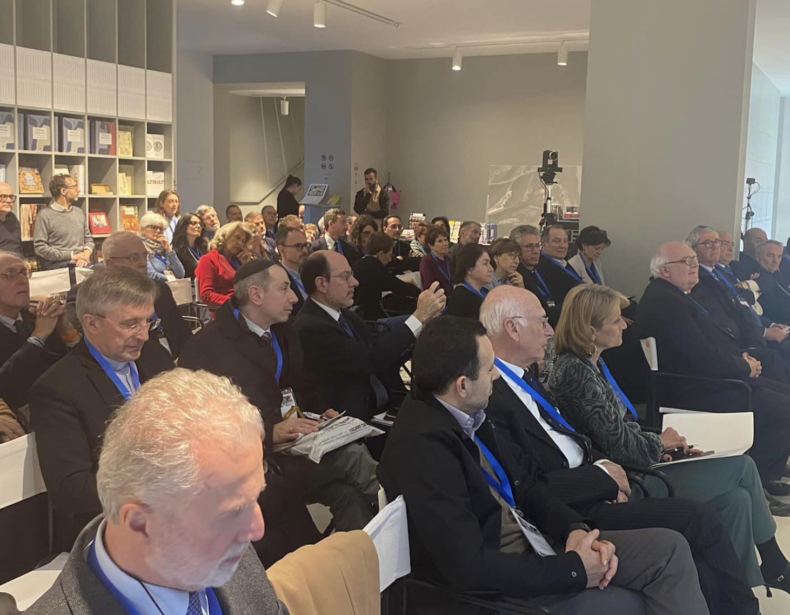Jewish and Catholic worlds allied in the fight against prejudice

Sixteen files to clarify some key points of Judaism, of its history, of Jewish life. Sixteen files aiming to promote an accurate portrayal of the Jewish world in textbooks and to fight and erase prejudices and stereotypes. “Sixteen files to get to know each other better” is a project addressing the field of education, jointly promoted by the Italian Bishops’ Conference-CEI and the Union of Italian Jewish Communities-UCEI and presented recently at the National Museum of Italian Judaism and the Shoah-MEIS of Ferrara. “A silent revolution”, as defined by the UCEI president Noemi Di Segni, concerning the textbooks used in Italian schools to teach Catholic religion.
“The realization of these files is an example of how the principle of responsibility can be implemented. We are grateful to the Catholic world, specifically to the Bishops’ Conference, for undertaking this path, a political decision which was not to be taken for granted”, pointed up Di Segni. “A small but huge step, resulting from the consciousness of the responsibility of the Church for centuries of persecution”. This four-year project, led by a team of prestigious experts, is a crucial step towards providing new generations with a correct education on Jewish people and Judaism, on their history and tradition. The importance of this objective has been repeatedly pointed out by the highest representatives of CEI and of the Jewish world during their speeches. “These files enable our students and teachers to open up to reality and dialogue with the others”, commented Giuseppe Baturi, secretary of CEI. And they are a starting point to fight antisemitism, which is increasing also among younger generations. “We all have faith that learning about the Jewish reality, meeting men and women who are keeping these traditions alive, might influence people’s behaviors”, hopes Baturi.
The files have been symbolically delivered to some of the most influential Italian publishers of textbooks for schools. They are the topic of three workshops coordinated by Livia Ottolenghi, UCEI Councillor of Education, and by Father Giuliano Savina, Director of the National Office for Ecumenism and Interreligious Dialogue of UCEI. “This is the beginning of a journey whose effects and backslidings will have to be monitored in the coming years”, said Ottolenghi.
Teachers from various Italian educational institutions took part in the workshops and had the opportunity to examine some of the files with the experts and give the first feedback. The workshops took place at the National Museum of Italian Judaism and the Shoah, hosted by its president Dario Disegni and its director Rav Amedeo Spagnoletto.
“Our goal is to ensure that school textbooks will not be a source of mistakes, distortions and biases anymore” explained Rabbi Ariel Di Porto, while presenting the files together with Ernesto Diaco, office director of CEI and manager of the National service of IRC (Teaching of Catholic Religion). The files are divided into three areas. The first focuses on “The fundamental concepts”, ranging from the meaning of the Torah in its written and oral form to the themes of justice and mercy, fighting Marcionism and the misrepresentation of a vindictive Jewish God. The second area revolves around the “Life of the Jewish community”, explaining the Jewish calendar, the cycle of life, the role of rabbis and of women. The third area, “The history of Judaism”, deals both with the people and the Land of Israel and with the origins of “Jesus/Jewish Yeshua” and “Paolo/Jewish Shaul”, and focuses on the development of the Jewish-Christian Dialogue.
Among others, Rabbi Alfonso Arbib, president of the Italian Rabbinical Assembly, and the Rabbi of Rome Riccardo Di Segni have expressed in their remote speeches their satisfaction with the project. “The project has an important role in the fight against antisemitism, particularly against hidden prejudices. It is not an easy task”, said Rabbi Arbib. “This work was an educational process, even for those who have carried it out, that will then engage educators and textbooks”, pointed out Rav Di Segni. “This is what dialogue is for: becoming aware that problems exist and trying to solve them with good will”.
Giuseppe Pecoraro, the new National Coordinator for the fight against anti-Semitism, expressed his hopes for the continuation of this dialogue and thanked his predecessor Milena Santerini for her work. MEIS president Disegni stressed the importance of choosing the right words, both in textbooks and everyday life: “How many times have we heard the words ‘Jewish’ and ‘Judaean’ being used interchangeably? And how many people really know the difference between “antisemitism” and “anti-Judaism”? Unfortunately, hatred also spreads through linguistic choices, therefore, once again, education is the only viable route, and thus the aim of these files”.
Fortunato Arbib, president of the Jewish Community of Ferrara, conveyed a similar message during his speech together with the Rabbi of the city Lucian Caro: “Our hope is that our grandchildren will take up the baton we pass them today, and will be able to gain knowledge of Jewish tradition free from historical and religious distortions”.
Translation by Marta Gustinucci, revised by Sofia Busatto, students at the Secondary School of Modern Languages for Interpreters and Translators of the University of Trieste, interns at the newspaper office of the Union of the Italian Jewish Communities – Pagine Ebraiche.
